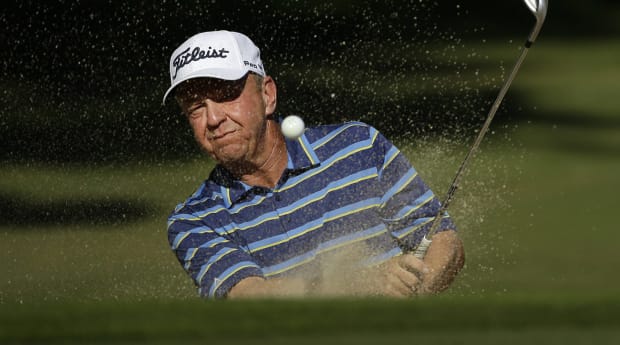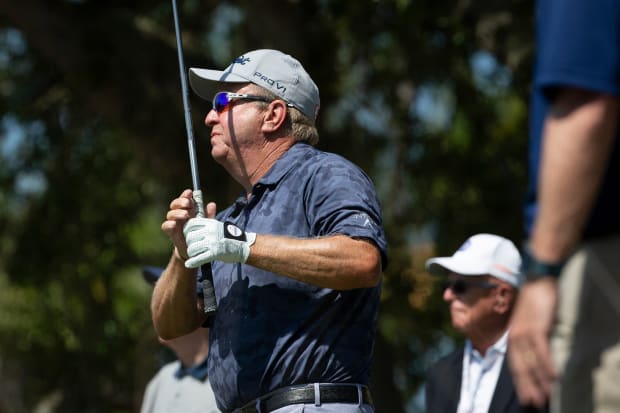After two and a half years, golfer Billy Mayfair is ready to publicize his diagnosis, in hopes of making a difference.
Billy Mayfair pauses. “I’m a little bit nervous,” he says.
At 14, Mayfair was on the cover of Boys’ Life magazine next to a headline reading, HARD-HITTING JUNIOR GOLF CHAMP. At 32, he became the only person to beat Tiger Woods in a playoff on the PGA Tour. (Years later, Woods approached Mayfair’s breakfast table at an event. “Can I sit here?” he asked. “Because everyone else is afraid of me.”) Mayfair won five events, including the 1995 Tour Championship. He is 54; he has been talking to reporters for most of his life.
But he has never had a conversation quite like this one. In November 2019, shortly after a bizarre sequence led to his disqualification from the Champions Tour Invesco QQQ Championship, he underwent a battery of tests. The results confirmed what his wife, Tami, had long suspected, and what Billy had long denied: Mayfair has autism spectrum disorder.
Two and a half years later, he has decided he is ready to publicize his diagnosis. Mayfair’s autism spectrum disorder, also known as ASD, resembles Asperger’s syndrome: He functions at a high level but also faces some challenges.
Mayfair says his primary issue is one of processing speed. “My brain gets going so quick that what I’m thinking and what comes out of my mouth could be two different things, and that’s why people sometimes misunderstand where I’m coming from,” he says. He has long been a slow player, constantly at risk of being put on the clock; he says this stems in part from how long it takes him to sort through information. Worse, he believes that he has developed a reputation over his 33 years of professional golf as obstinate and defiant.
“I would come home and or go back to the hotel and lay there and 30 minutes later I’d go, ‘Why did I answer that way? That was a stupid answer, Billy,’ ” he says.

It was one of those miscommunications, he says, that spurred him to see doctors. Twice during the second round of the 2019 Invesco QQQ Championship near Los Angeles, he faced rules questions: once about how long it took him to find a lost ball, and once about whether he caused his ball to move in the rough. And twice, officials said, he misrepresented what had happened. Now he insists that he was in the right, and that he has learned strategies to explain himself.
If he knew then what he knows now, he says, “I would not have let the Tour—and not just the Tour but TV—take advantage of me. They bullied me and they took advantage of the situation. I would have argued with them. I would have stood up for myself. I would have said, ‘No, I did everything correctly.’ ” (A PGA Tour Champions spokesman says, "The TOUR remains confident in the ruling applied to Billy at the Invesco QQQ Championship in 2019.")
Instead, Mayfair muddled through the controversy. The story blew up. Mayfair was disqualified.
And Tami was exhausted. She had long noticed how literal her husband was, how he never seemed to know when to give her a hug, how easily flustered he became. He seemed unable to have rational exchanges with officials. He would either submit, get frustrated or blow up. That left Tami wondering whether she should intervene.
“On the golf course, I can’t do that,” she says. “I can’t explain. I’m outside the ropes, and I’m watching the meltdown, and I’m watching the miscommunication, and I’m having what I call a flat-hot come-apart, because I can’t help.”
She traveled to tournaments with him, and she made a point to visit with doctors in each city, hoping someone would give her the answers she craved. But there was not much they could do without a patient. So after the fiasco in L.A., she insisted.
“He went kicking and screaming,” Tami says.
“Just kicking,” Billy interjects.

Mayfair dreaded the diagnosis. But once he received it, he felt only relief. He had always known he did not quite fit in the world: People were forever making jokes he did not quite understand. He flunked timed tests but aced untimed ones. Breaks in routine gave him fits. Suddenly he felt less alone—and more hopeful.
He and Tami both meet with psychiatrists now, and they have both learned more about how to relate to each other. Tami has learned that if she needs a hug, she should ask for one rather than hoping he will intuit her feelings. And Billy has learned to manage feelings of stress that once overwhelmed him.
“Every week I play, I think it’s a new learning process for me, but I’m understanding that it’s O.K. to be nervous,” he says. “It’s O.K. to get my brain—if my brain really starts going fast and getting out of touch, slow it down. It’s O.K. to slow down. It’s O.K. to take a couple minutes and take a deep breath and wait and just let everything kind of get caught up.”
He is talking about his diagnosis now for a few reasons. He wants to change people’s perception of him. He is also working with the Champions Tour to make some accommodations for him. For example, he has asked officials to approach him only about slow play before a tee shot, not while he is walking down the fairway. Once he has begun play on a hole, he explains, any change in routine interrupts his thought process and ends up making him play even slower. (Even golfers without autism would benefit from such an adjustment, he says. “Why would you not want to tell them before they hit their first shot on that hole?” he asks. “I can't figure out why they ever did it that way.”)
He and Tami also hope to do charity work supporting autistic athletes and their loved ones. “This is not just [about] one individual,” she says. “It affects the family.”
But mostly, he wants to set an example for people in similar situations. “Look at what I’ve done in my career,” he says. “Not only am I a very good athlete, I’m also a good husband. I have a great wife. I’m happily married. I have a wonderful son. I have lived, and I am living, the dream life. And just because I have this disability doesn’t mean that I can’t have that.”
More Golf Coverage:
• Best Moments from the 2021 Masters
• Matsuyama's Methodical Masters Approach Was an Apt Path to Victory
• Inside Will Zalatoris's Fraught Journey to Runner-Up at Augusta